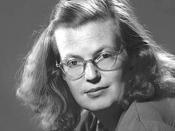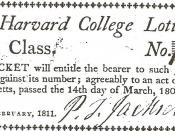In Shirley Jackson's short story "The Lottery", she uses many literary devices. However the most prevalent are irony and symbolism. Jackson uses irony and symbolism to illustrate the underlying darker theme not evident in the beginning of the short story. The use of irony is in almost every paragraph. Even the title of the story is ironic because it represents something positive but in the end the reader finds the true meaning of the title to be negative. "Part of the horrific effect of Jackson's writing stems from the author's technique of unfolding plot as if it were conventional, even though it is not." (Wagner-Martin). Thus, through irony and symbolism Jackson paints a grim portrait of life and death in this small town.
First she sets the story in a very quaint, quiet and small town. The story takes place in early summer on a beautiful day.
"The morning of June 27th was clear and sunny, with fresh warmth of a full-summer day; the flowers were blossoming profusely and the grass was richly green" (499). This description of the setting gives the reader the idea of a normal peaceful town. Jackson describes the middle of town as having a "... post office and a bank..." (499). She never mentions a church or courthouse which are normally focal points in any small town. This irony represents that the townspeople have
Patterson 2
no respect for morals or authority. The setting for the lottery also takes place in the same area "as were the square dances, the teenage club, the Halloween program..." (500). This is ironic because the reader learns that the actual purpose of the lottery is to choose someone who becomes a sacrifice for the town. This does not stay on the conscience of the townspeople because...


